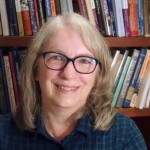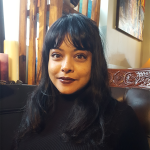Staff
Katherine Pratt Ewing
Director of the Institute for Religion, Culture, and Public Life
Contact • CV
Katherine Pratt Ewing, Professor in the Department of Religion and the  South Asia Institute, is also Coordinator of the Master of Arts Program at SAI and Director of the Center for the Study of Religion and Sexuality. Until 2010, she was Professor of Cultural Anthropology and Religion at Duke University, where she served as the Executive Director of the North Carolina Consortium for South Asian Studies. In 2010-2011 she was Professor of Anthropology at the University of Wisconsin – Madison before moving to Columbia’s Religion Department in 2011. Her research ranges from debates among Muslims about the proper practice of Islam in the modern world to sexualities, gender, and the body in South Asia. She has done ethnographic fieldwork in Pakistan, Turkey, and India, and among Muslims in Germany, The Netherlands, and the United States.
South Asia Institute, is also Coordinator of the Master of Arts Program at SAI and Director of the Center for the Study of Religion and Sexuality. Until 2010, she was Professor of Cultural Anthropology and Religion at Duke University, where she served as the Executive Director of the North Carolina Consortium for South Asian Studies. In 2010-2011 she was Professor of Anthropology at the University of Wisconsin – Madison before moving to Columbia’s Religion Department in 2011. Her research ranges from debates among Muslims about the proper practice of Islam in the modern world to sexualities, gender, and the body in South Asia. She has done ethnographic fieldwork in Pakistan, Turkey, and India, and among Muslims in Germany, The Netherlands, and the United States.
Professor Ewing received her PhD in Anthropology from the University of Chicago in 1980 and took postdoctoral training at the Chicago Institute for Psychoanalysis. She has received numerous awards and honors, including the L. Bryce Boyer Prize of the Society for Psychological Anthropology (1990), a Berlin Prize Fellowship at the American Academy in Berlin (1999), a Mellon-Sawyer Seminar grant (2000-2002), and a Residential Fellowship as Visiting Scholar at the Russell Sage Foundation (2006-7). Her books include Arguing Sainthood: Modernity, Psychoanalysis and Islam (1997), Stolen Honor: Stigmatizing Muslim Men in Berlin (2008), and the edited volumes Shariat and Ambiguity in South Asian Islam (1988) and Being and Belonging: Muslim Communities in the US since 9/11 (2008).
 Walid Hammam
Walid Hammam
Associate Director of the Institute for Religion, Culture, and Public Life
Associate Director Walid Hammam joined the IRCPL in July, 2014. He has worked at American University and UNICEF, and brings to the Institute a background in international affairs and policy analysis.
 Joymala Hajra- Manager, Design & Communications
Joymala Hajra- Manager, Design & Communications
Joya joined IRCPL in January 2017. She brings twenty years professional design experience to the institute. Joya holds a B.F.A. from The Fashion Institute of Technology and an M.A in South Asian Studies from Columbia University.
Former Directors of the IRCPL:
Mark C. Taylor
Mark C. Taylor is the Chair of the Department of Religion at Columbia University and a founding Co-Director of the Institute for Religion, Culture, and Public Life (IRCPL). A leading figure in debates about postmodernism, Taylor has written on topics ranging from philosophy, religion, literature, art and architecture to education, media, science, technology and economics.
Taylor received a Doktorgrad (Philosophy) from the University of Copenhagen in 1981, a Ph.D. in religion from Harvard (1973), and a B.A. from Wesleyan University (1968). The many awards and honors he has received include: Wesleyan University Distinguished Alumnus Award (1998), Carnegie Foundation for the Advancement of Teaching, Professor of the year (1995), Rektor’s Medal, University of Helsinki (1993), American Academy of Religion Awards for Excellence for his books Nots (1994) and Altarity (1998), and Guggenheim Fellowship (1979-80).
His many books include: Journeys to Selfhood: Hegel and Kierkegaard (1980), Erring: A Postmodern A/Theology (1984), Disfiguring: Art, Architecture, Religion (1994), Hiding (1997), About Religion: Economies of Faith in Virtual Culture (1999), The Moment of Complexity: Emerging Network Culture (2001), Confidence Games: Money and Markets in a World Without Redemption (2006), Mystic Bones (2007), After God (2007). In addition to his writing, Taylor has produced a CD-ROM, Motel Real: Las Vegas, Nevada, and has had an exhibition of the artwork accompanying his book, Grave Matters, at the Mass MOCA.
Alfred Stepan
Alfred Stepan is Wallace Sayre Professor of Government, the founding Director of the Center for the Study of Democracy, Toleration, and Religion (CDTR), and a founding Co-Director of the Institute for Religion, Culture, and Public Life (IRCPL).
He was the founding Rector and President of Central European University in Budapest, Prague, and Warsaw and was the former Director on the Concilium on International and Area Studies at Yale University and the Dean of the School of International Affairs at Columbia University.
His two most recent books are Alfred Stepan, Juan J. Linz, Yogendra Yadav, Democracy in Multinational Societies: India and Other Polities, (Baltimore: Johns Hopkins University Press, 2010) and Democracies in Danger, Alfred Stepan, ed., (Baltimore: Johns Hopkins University Press, 2009).
Some of his other books include Arguing Comparative Politics (Oxford 2001); Problems of Democratic Transition and Consolidation: Southern Europe, South America, and Post-Communist Europe, with J. J. Linz (Johns Hopkins 1996); Rethinking Military Politics: Brazil and the Southern Cone (Princeton 1988); The Breakdown of Democratic Regimes, edited with Juan J. Linz (Johns Hopkins 1978); The State and Society: Peru in Comparative Perspective (Princeton 1978); and The Military in Politics: Changing Patterns in Brazil (Princeton 1971).
Stepan’s teaching and research interests include comparative politics, theories of democratic transitions, federalism, and the world’s religious systems and democracy. In the last two years, he has conducted field research in India, Indonesia, Sri Lanka, Israel, Palestine, and Brazil.
Karen Barkey
Karen Barkey, Haas Distinguished Chair of Religious Diversity at California Berkeley, was a member of the board of IRCPL since its founding, and became the Director in 2013. In 2016, she left Columbia University for the University of California, Berkely.
A recently published volume of essays, Choreography of Sacred Spaces: State, Religion and Conflict Resolution, edited by Barkey and Elazar Barkan, explores the history of shared religious spaces in the Balkans, Anatolia and Palestine/Israel, all three regions once under Ottoman rule. The project provides the historical antecedents to help us understand the accommodation and contention around specific sites in the modern period, tracing comparatively areas and regime changes.
Her books include Bandits and Bureaucrats: The Ottoman Route to State Centralization (Cornell University Press, 1994); After Empire: Multiethnic Societies and Nation-Building: The Soviet Union, and the Russian, Habsburg and Ottoman Empires, ed. with Mark von Hagen (Westview Press, 1997); Empire of Difference: The Ottomans in Comparative Perspective (Cambridge UP, 2008).
Bandits and Bureaucrats received the Allan Sharlin Memorial Award for outstanding book of the year in Social Science History, 1995 Social Science History Association. Empire of Difference was awarded The 2009 Barrington Moore Award from the Comparative Historical Sociology section at American Sociology Association and the 2009 J. David Greenstone Book Prize from the Politics and History section at the Political Science Association.
Josef Sorett
Josef Sorett is a member of the faculty at Columbia University, where he is an Assistant Professor of Religion and African-American Studies and Associate Director of the Institute for Religion, Culture, and Public Life (IRCPL). Josef is also the founding director of the Center on African American Religion, Sexual Politics and Social Justice (CARSS), which is located within Columbia’s Institute for Research in African-American Studies (IRAAS).
As an interdisciplinary scholar of religion and race in the Americas, Josef employs primarily historical and literary approaches to the study of religion in black communities and cultures in the United States. He has a special interest in how ideas about religion inform broader conversations about culture and society, and how such ideas emerge and take shape in (discursive and physical) spaces typically assumed to be outside the provenance of “religion.” His current research addresses two central themes: 1) how ideas about religion have animated histories of African American literature, arts and popular culture, and 2) the relationship between the cultural politics of religious institutions (especially black churches) and American public life.
Josef’s research has been supported with grants from the Woodrow Wilson Foundation, the Louisville Institute for the Study of American Religion, and the Fund for Theological Education (now the Forum for Theological Exploration). He has published essays and reviews in Culture and Religion, Callaloo, the Journal for the Scientific Study of Religion, and PNEUMA: Journal of the Society for Pentecostal Studies. His current book project, Spirit in the Dark: A Religious History of Racial Aesthetics (Oxford University Press, forthcoming 2015) illumines how religion has figured in debates about black art and culture. He is also editing an anthology that is tentatively titled, The Sexual Politics of Black Churches. Josef received his Ph.D. in African American Studies from Harvard University; and he holds a B.S. from Oral Roberts University, and an M.Div. from Boston University.
Josef’s writing and commentary have appeared in a range of popular media outlets, including ABC News, the New York Times, and the Washington Post, as well as on the BBC and NPR. He is also a member of American Academy of Religion’s Committee for the Public Understanding of Religion.
